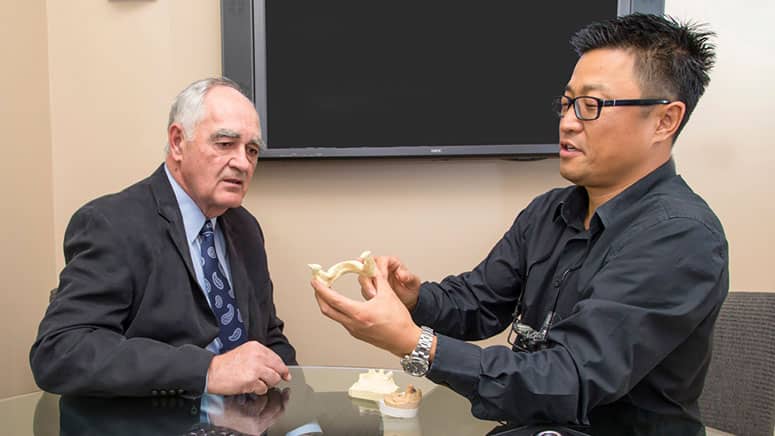
Are missing teeth interfering with your chewing and speaking abilities, affecting your face shape, or causing general discomfort? Dental bridges could restore your lost teeth and improve your oral health.
Softouch Dental Care, led by Dr. Michael Chung, a graduate of the Las Vegas Institute for Advanced Dental Studies, offers dental bridges to address gaps left by missing teeth. Dr. Chung and his team are dedicated to delivering personalized general and cosmetic dentistry services in a comfortable and welcoming environment.
What Are Dental Bridges?
A dental bridge is a fixed restoration. It replaces one or more missing teeth by using artificial teeth anchored to natural teeth on either side of the gap.
There are four main types of dental bridges, each supported differently:
- Traditional dental bridges: These are anchored by crowns on the two neighboring teeth. Even though the adjacent teeth are healthy, some of their enamel is removed to make room for the crown. The artificial tooth replacing your missing tooth is then attached to them on each side.
- Bonded dental bridges: These are anchored by a metal framework with a “wing” on each side that connects to the existing teeth.
- Cantilever dental bridges: These are anchored only on one side. When no tooth is present on one side of the gap (i.e., you’re missing a back tooth), the two teeth on the other side are given crowns. This provides extra support from that side to compensate for the lack of support on the first side.
- Implant-supported dental bridges: Some modern cosmetic dentists support the bridge with a dental implant. An implant-supported bridge replaces multiple missing teeth by anchoring a custom prosthetic to titanium implants surgically placed in the jawbone. This approach replaces the missing tooth and the missing tooth root.
Our Results Speak For Themselves...
“I have received endless compliments on my smile. When I am on TV hosting a skating event, I smile with confidence and that smile creates a warm and welcoming feeling for the audience.
Dr. Chung and his team are very friendly and professional. Thank you, Softouch Dental!”
-Michael Weiss, Champion Figure Skater
Benefits of Dental Bridges
A good dental bridge will:
- Restore your full ability to chew and speak
- Prevent other teeth from moving to fill the gap
- Preserve the youthful shape of your face
- Restore your smile
- Keep your bite healthy by distributing forces properly

Candidates for Dental Bridges
Dental bridges are ideal for patients who are missing one to four teeth in a row or have a large gap from missing teeth. Dental bridges are often considered the middle ground between partial dentures and dental implants, as they are usually more comfortable and affordable for the average person.
Ideal candidates for dental bridges should have good oral health. While missing teeth are okay, you should be free of gum disease or other oral conditions that could make it difficult to recover from the dental bridge procedure.
Contraindications for Dental Bridges
If you have severe periodontitis, malocclusion, gum disease, or are prone to oral infection, you should not get a dental bridge. People with broken or decayed teeth may also struggle to maintain a healthy dental bridge, as their teeth will be weaker.
If this sounds like you, we recommend scheduling a consultation to address your oral health before beginning your dental bridge procedure.
Preparation for Dental Bridge Procedures
Preparing for your dental bridge procedure may take extra dental work. This is to ensure that your teeth and mouth are healthy enough to sustain the dental bridges being put in place.
Consulting with Dr. Chung about your dental needs before your dental bridge procedure will help determine whether or not you’ll need a tooth extraction or other treatments first.
Dental Bridge Recovery

Recovery after getting your dental bridges placed is relatively quick.
Patients may experience soreness, tooth and gum sensitivity, and discomfort after their procedure. However, these side effects will begin to disappear within a week or two as your mouth adjusts to the feeling of your dental bridges.
During your recovery period, it’s best to stay away from sticky, hard, staining, salty, and acidic foods to preserve the health of your bridges.
Caring for Dental Bridges
To make your dental bridges last as long as possible, stick to a consistent care routine. This should include:
- Brushing your teeth twice a day and flossing once a day (or using a water pick to clean underneath the bridge).
- Using a mouthwash designed to kill bacteria.
- Avoiding whitening pastes, as they may encourage the breakdown of the bridge faster than normal.
FAQs
How Long Do Dental Bridges Last?
Dental bridges typically last 5 to 15 years. However, some can remain functional for over 20 years.
The longevity of a bridge depends on the materials used. Porcelain or ceramic bridges tend to wear down faster than metal or porcelain-fused-to-metal options, but they offer a more natural appearance.
Oral hygiene habits also play a role. A bridge’s lifespan can be shortened by tooth decay, gum disease, or excessive biting pressure from teeth grinding.
Can a Dental Bridge Be Replaced if It Gets Damaged or Worn Out?
A dental bridge can be replaced if it becomes damaged, worn out, or loose. Over time, bridges may fracture, chip, or weaken due to normal wear and tear, poor fit, or underlying issues like gum disease or decay in the supporting teeth. If the damage is minor, Dr. Chung may repair the bridge instead of replacing it.
When a bridge needs full replacement, Dr. Chung will remove it, assess the supporting teeth, and determine if they need treatment before placing a new one. Additional dental work like crowns, root canals, or implants may be necessary before fitting a replacement bridge if the supporting teeth are compromised or weakened.
What Are Signs a Bridge is Compromised?
A compromised dental bridge can lead to discomfort, functional issues, and potential damage to surrounding teeth. Here are some signs that indicate a problem:
- Looseness or Movement: If the bridge shifts while chewing or speaking, it may have lost adhesion or the supporting teeth may have weakened.
- Pain or Sensitivity: Discomfort when biting down or sensitivity to hot and cold foods could indicate underlying decay or damage to the abutment teeth.
- Visible Damage: Chips, cracks, or worn-down areas on the bridge suggest structural weakening.
- Gum Inflammation: Swelling, redness, or bleeding around the bridge may point to gum disease or a poor fit.
- Food Trapping: Food frequently getting stuck under or around the bridge may indicate a poor seal or misalignment.
Is It Possible To Get Cavities Under a Dental Bridge?
Cavities can form under a dental bridge if bacteria and plaque accumulate around the supporting teeth. The bridge is made of artificial materials that don’t decay. However, the natural teeth underneath are still vulnerable.
Poor oral hygiene is the most common cause of decay under a bridge. It allows food particles and bacteria to get trapped around the bridge’s margins.
If decay develops under a bridge and isn’t treated, it can lead to pain, infections, or the need for a bridge replacement. Early intervention can help preserve the integrity of the supporting teeth and extend the bridge’s lifespan.
Why Choose Softouch Dental Care?
Softouch Dental Care, led by Dr. Michael Chung, offers top-tier cosmetic and restorative dentistry with a commitment to patient satisfaction.
Dr. Chung is a graduate of Johns Hopkins University and the University of Maryland’s College of Dental Surgery. He also has over 15 years of advanced training at the prestigious Las Vegas Institute.
As an LVI Fellow, Dr. Chung specializes in full-mouth rejuvenation, porcelain veneers, TMJ treatment, and dental implants. His attention to detail, cutting-edge technology, and five-star service benefit patients in Oakton and the surrounding areas.
Schedule A Consultation with Dr. Chung!
At Softouch Dental Care, we believe that an educated patient is the best kind. Please give us a call at 703-319-6990 or fill out the contact form on this page to schedule a consultation about dental bridges with Dr. Chung.
Our office serves Oakton, Vienna, McLean, Tysons Corner, Reston, Arlington, Fairfax, Washington D.C., and the Northern Virginia area.

